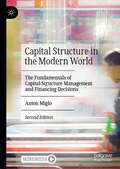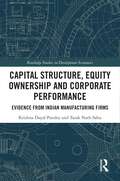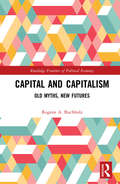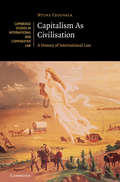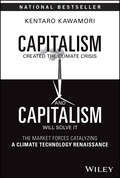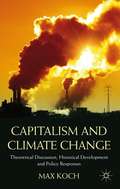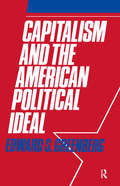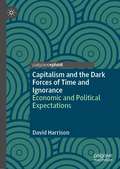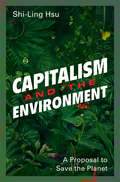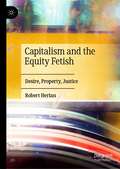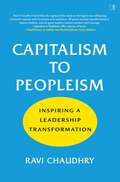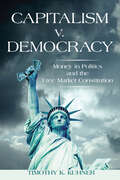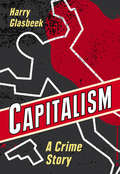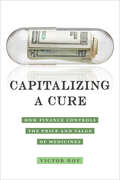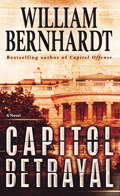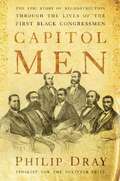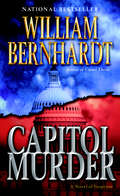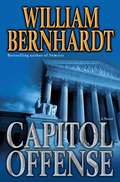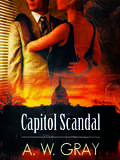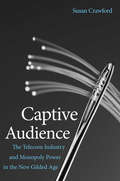- Table View
- List View
Capital Structure in the Modern World: The Fundamentals of Capital Structure Management and Financing Decisions
by Anton MigloThis book focuses on microeconomic foundations of capital structure theory. It combines theoretical results with a large number of examples, exercises and applications. The book examines fundamental ideas in capital structure management, some of which are still not very well understood in the business community, such as Modigliani and Miller&’s irrelevance result, trade-off theory, pecking-order theory, asset substitution, credit rationing and debt overhang. The second edition also covers capital structure issues related to recent developments in financial technology including crowdfunding and token issues and discusses significant differences between these innovative ways of firm financing compared to traditional debt and equity. Chapters also discuss the ways in which financial economists were forced to look critically at capital structure after the financial crisis of 2007-2009 and the COVID-19 pandemic, as the problems faced by many companies stemmed from their financing policies. Further the book analyzes links between capital structure and firm&’s performance, corporate governance, firm&’s strategy and flexibility, and covers such topics as life cycle approach to capital structure management, capital structure of small and start-up companies, corporate financing versus project financing and examples of optimal capital structure analyses for different companies. This comprehensive guide to capital structure theory will be of interest to all students, academics and practitioners seeking to understand this fast-developing and critical area.
Capital Structure, Equity Ownership and Corporate Performance: Evidence from Indian Manufacturing Firms (Routledge Studies in Development Economics)
by Tarak Nath Sahu Krishna Dayal PandeyThis book provides empirical insights into the relationship between capital and equity-ownership structure of Indian manufacturing companies and their financial performance. It discusses and analyses the basic theories and concepts associated with capital structure, debt financing, levered and unlevered firms, the various forms of ownership, agency problem and its kind and the exploitation of minority owners by the large and largest owners. The study employs a set of the most reliable and suitable econometric estimation techniques to draw meaningful inferences on the Indian manufacturing sector. The novelty of this book lies in three particular aspects: the depth and dimension with which the topic is addressed; the robust empirical evidence that it has produced and the simple and intelligible approach with which it is authored. It communicates the crucial relevance of corporate capital structure and equity-ownership to the moderation of agency relationship and shaping the internal governance mechanism, which ultimately results in increased or decreased operational efficiency and financial performance. It will enable readers to understand whether an increased amount of debt capital would bring about positive results for firms or create an extra burden on the management of their finances, preventing them from taking productive investment decisions due to the threat of liquidation. The book will find an audience among advanced students, scholars and researchers who are interested in understanding the corporate finance practices and governance mechanism of Indian organizations.
Capital and Capitalism: Old Myths, New Futures (Routledge Frontiers of Political Economy)
by Rogene A. BuchholzCapitalist societies need to undergo major change to provide for the material needs of all the people who work within the system, not just the 1 percent. They have become dysfunctional and need a different kind of orientation to continue in existence. Instead of creating wealth, which is what they are supposed to accomplish, they have created nothing but debt for the past several decades and are now in serious trouble with regard to finding the wherewithal to keep on functioning as viable societies that can provide job opportunities for their workers and the promise of a better life in the future for their citizens. The coronavirus pandemic has exposed just how many people live paycheck to paycheck and have not been able to accumulate any kind of savings. The 1 percent, meanwhile, have benefited greatly and have vastly increased their wealth over the past several decades. This book does not advocate the need to turn to a form of socialism, however, to give most workers a chance at a decent life for themselves. What is needed is a redefinition of capitalism to make it work for everyone. Capital and Capitalism seeks to uncover various myths about capitalism that hinder our ability to change the system and discuss the task of redefining capitalism by examining where neo-liberalism went wrong and what role restructuring the corporation along stakeholder lines can play in making capitalism more responsive to the entire society. It will be of interest to researchers, academics, and students in the fields of business and society, leadership, and business ethics.
Capital and Capitalism: Old Myths, New Futures (Routledge Frontiers of Political Economy)
by Rogene A. BuchholzCapitalist societies need to undergo major change to provide for the material needs of all the people who work within the system, not just the 1 percent. They have become dysfunctional and need a different kind of orientation to continue in existence. Instead of creating wealth, which is what they are supposed to accomplish, they have created nothing but debt for the past several decades and are now in serious trouble with regard to finding the wherewithal to keep on functioning as viable societies that can provide job opportunities for their workers and the promise of a better life in the future for their citizens. The coronavirus pandemic has exposed just how many people live paycheck to paycheck and have not been able to accumulate any kind of savings. The 1 percent, meanwhile, have benefited greatly and have vastly increased their wealth over the past several decades. This book does not advocate the need to turn to a form of socialism, however, to give most workers a chance at a decent life for themselves. What is needed is a redefinition of capitalism to make it work for everyone. Capital and Capitalism seeks to uncover various myths about capitalism that hinder our ability to change the system and discuss the task of redefining capitalism by examining where neo-liberalism went wrong and what role restructuring the corporation along stakeholder lines can play in making capitalism more responsive to the entire society.It will be of interest to researchers, academics, and students in the fields of business and society, leadership, and business ethics.
Capital without Borders
by Brooke HarringtonHow do the one percent keep getting richer despite financial crises and the myriad of taxes on income, capital gains, and inheritance? Brooke Harrington interviewed professionals who specialize in protecting the fortunes of the world's richest people: wealth managers. To gain access to their tactics and mentality, she trained to become one of them.
Capitalism As Civilisation: A History of International Law (Cambridge Studies in International and Comparative Law #142)
by Ntina TzouvalaMethodologically and theoretically innovative, this monograph draws from Marxism and deconstruction bringing together the textual and the material in our understanding of international law. Approaching 'civilisation' as an argumentative pattern related to the distribution of rights and duties amongst different communities, Ntina Tzouvala illustrates both its contradictory nature and its pro-capitalist bias. 'Civilisation' is shown to oscillate between two poles. On the one hand, a pervasive 'logic of improvement' anchors legal equality to demands that non-Western polities undertake extensive domestic reforms and embrace capitalist modernity. On the other, an insistent 'logic of biology' constantly postpones such a prospect based on ideas of immutable difference. By detailing the tension and synergies between these two logics, Tzouvala argues that international law incorporates and attempts to mediate the contradictions of capitalism as a global system of production and exchange that both homogenises and stratifies societies, populations and space.
Capitalism Created the Climate Crisis and Capitalism Will Solve It: The Market Forces Catalyzing a Climate Technology Renaissance
by Kentaro KawamoriCreative and practical free-market solutions to climate change In Capitalism Created the Climate Crisis and Capitalism Will Solve It: The Market Forces Catalyzing a Climate Technology Renaissance, distinguished author Kentaro Kawamori delivers a fascinating and timely exploration of the interplay between capitalism and climate change. He explains how the capitalist system helped to contribute to the current crisis of global warming and how that same system will help to end it. In the book, the author discusses the enormous impact of the climate crisis and how the government, the modern finance industry, the fossil fuel industry, and others combined to accelerate the warming of the world. He then considers the roles those same players will play to reverse this effect in the coming years. You’ll also find: Discussions of how climate tech innovations will transform the economy and how technology disruptors will become involved in the process The ways the energy industry will change to incorporate the realities and consequences of a warming climate Explorations of the incentives created by free market structures and how to include climate stakeholders in the discussionAn engaging and exciting new resource for anyone interested in the intersection of economics, business, and the environment, Capitalism Created the Climate Crisis and Capitalism Will Solve It contains practical and thoughtful climate prescriptions for a world desperately in need of them.
Capitalism and Climate Change: Theoretical Discussion, Historical
by Max KochThis book discusses climate change as a social issue, examining the incompatibility of capitalist development and Earth's physical limits and how these have been regulated in different ways. It addresses the links between modes of consumption, energy regimes and climate change during Fordism and finance-driven capitalism.
Capitalism and the American Political Ideal
by GrenbergThis practical handbook has been revised to provide in-depth coverage of the Office of Thrift and Supervision rules as well as those of the OCC. It includes up-to-date information on every of trust compliance, as it applies in 2000.
Capitalism and the Dark Forces of Time and Ignorance: Economic and Political Expectations
by David HarrisonThis book explores the role of expectations within the modern capitalist system. Through looking at how they are formed and develop, the impact of events that lead to a collapse in expectations, such as a major financial crisis, is examined to highlight the precarious and unstable nature of the economic system. With a particular focus on the UK and USA, it is also considered how public policy and institutions can shift the balance away from speculation and back towards enterprise. This book aims to conceptualise instability and highlight how economic and regulatory policy can limit it. It will be relevant to researchers and policymakers interested in economic policy and regulatory reform.
Capitalism and the Environment: A Proposal to Save the Planet
by Shi-Ling HsuRising economic inequality has put capitalism on trial globally. At the same time, existential environmental threats worsen while corporations continue to pollute and distort government policy. These twin crises have converged in calls to revamp government and economic systems and to revisit socialism, given up for dead only 30 years ago. In Capitalism and the Environment, Shi-Ling Hsu argues that such an impulse, if enacted, will ultimately harm the environment. Hsu argues that inequality and environmental calamities are political failures – the result of bad decision-making – and not a symptom of capitalism. Like socialism, capitalism is composed of political choices. This book proposes that we make a different set of choices to better harness the transformative power of capitalism, which will allow us to reverse course and save the environment.
Capitalism and the Equity Fetish: Desire, Property, Justice
by Robert HerianThis book is a provocative, interdisciplinary, and critical appraisal of civil justice, property, and the laws that shape and command them within capitalism. Dr. Herian’s book is both a complementary and countervailing narrative to many mainstream legal accounts, one that critiques core and influential areas of legal knowledge and practice. Central to the book’s thesis is a rich collaboration of ideas and perspectives that consider what is at stake from institutions, concepts, and practices of equity and civil justice tied to the subjective psychic life and the unconscious desires of capitalist stakeholders. The book aims to address several questions, including how capitalism has imagined and shaped equity and civil justice since the nineteenth century; how capitalism acts as a well-spring of desire for forms of justice that wrap-around and sustain complex frameworks of private property power and ownership; and how equity supports agile neoliberal strategies of justice and reason in the twenty-first century.
Capitalism to Peopleism: Inspiring a Leadership Transformation
by Ravi ChaudhryOur world faces multiple existential challenges. The ways of doing business and governing nations are now dysfunctional and we are traversing the abyss to extinction. This book identifies a credible path to bypass this disaster. It is anchored on a leadership leap from &‘knowledge&’ to &‘wisdom&’, driven by political and business leaders manifesting key traits of awareness, bridge-building, and compassion. We are at a watershed moment in human history. While capitalism is unreformable and set for burial, capitalists (owners of capital) can flourish, provided they embrace the inescapable truism that the primacy of profit must make way for the predominance of people and the planet. This demands a paradigm shift from capitalism to Peopleism—a new system of governance that will nurture true democracy rooted in equity, sustainability, transparency, and justice.Capitalism to Peopleism is not just a game-changer; it is a new game-creator. It evolves the essential features of &‘an economics that works for all&’, emphasizing a growth strategy that discards the myth of &‘trickle-down&’ policies to unveil a &‘surge-up&’ development structure, not in incremental tweaks but through systemic transformation. The book invites you to &‘shape your future before it shapes you&’. It is a book that inspires and empowers everyone who aspires to live in a safer, happier world.
Capitalism v. Democracy: Money in Politics and the Free Market Constitution
by Timothy K. KuhnerAs of the latest national elections, it costs approximately $1 billion to become president, $10 million to become a Senator, and $1 million to become a Member of the House. High-priced campaigns, an elite class of donors and spenders, superPACs, and increasing corporate political power have become the new normal in American politics. In Capitalism v. Democracy, Timothy Kuhner explains how these conditions have corrupted American democracy, turning it into a system of rule that favors the wealthy and marginalizes ordinary citizens. Kuhner maintains that these conditions have corrupted capitalism as well, routing economic competition through political channels and allowing politically powerful companies to evade market forces. The Supreme Court has brought about both forms of corruption by striking down campaign finance reforms that limited the role of money in politics. Exposing the extreme economic worldview that pollutes constitutional interpretation, Kuhner shows how the Court became the architect of American plutocracy. Capitalism v. Democracy offers the key to understanding why corporations are now citizens, money is political speech, limits on corporate spending are a form of censorship, democracy is a free market, and political equality and democratic integrity are unconstitutional constraints on money in politics. Supreme Court opinions have dictated these conditions in the name of the Constitution, as though the Constitution itself required the privatization of democracy. Kuhner explores the reasons behind these opinions, reveals that they form a blueprint for free market democracy, and demonstrates that this design corrupts both politics and markets. He argues that nothing short of a constitutional amendment can set the necessary boundaries between capitalism and democracy.
Capitalism, Corporations and the Social Contract
by Samuel F. MansellIn whose interests should a corporation be run? Over the last thirty years the field of 'stakeholder theory' has proposed a distinctive answer: a corporation should be run in the interests of all its primary stakeholders - including employees, customers, suppliers and financiers - without contradicting the ethical principles on which capitalism stands. This book offers a critique of this central claim. It argues that by applying the political concept of a 'social contract' to the corporation, stakeholder theory in fact undermines the principles on which a market economy is based. The argument builds upon an extensive review of the stakeholder literature and an analysis of its philosophical foundations, particularly concerning the social contract tradition of John Rawls and his predecessors. The book concludes by offering a qualified version of Milton Friedman's shareholder theory as a more justifiable account of the purpose of a corporation.
Capitalism: How Law Shelters Shareholders And Coddles Capitalism
by Harry GlasbeekA mugger to a stranger, “Give me your wallet or I will beat you to pulp!” It is a crime. An employer says to a worker: “Adding lung-saving ventilation will reduce my profit. Give me back some of your wages and I will let you keep your lungs!” This is not a crime. Our assumptions about the world condition us to see these situations as legally different from one another. But what if we, the critics of corporate capitalism, instead insisted on taking the spirit of law, rather than its letter, seriously? It would then be possible to describe many of the daily practices of capitalists and their corporations as criminal in nature, even if not always criminal by the letter and formality of law. In Capitalism: A Crime Story, Harry Glasbeek makes the case that if the rules and doctrines of liberal law were applied as they should be according to law’s own pronouncements and methodology, corporate capitalism would be much harder to defend.
Capitalizing a Cure: How Finance Controls the Price and Value of Medicines
by Victor RoyA free open access ebook is available upon publication. Learn more at www.luminosoa.org.Capitalizing a Cure takes readers into the struggle over a medical breakthrough to investigate the power of finance over business, biomedicine, and public health. When curative treatments for hepatitis C launched in 2013, sticker shock over their prices intensified the global debate over access to new medicines. Weaving historical research with insights from political economy and science and technology studies, Victor Roy demystifies an oft-missed dynamic in this debate: the reach of financialized capitalism into how medicines are made, priced, and valued. Roy’s account moves between public and private labs, Wall Street and corporate board rooms, and public health meetings and health centers to trace the ways in which curative medicines became financial assets dominated by strategies of speculation and extraction at the expense of access and care. Provocative and sobering, this book illuminates the harmful impact of allowing financial markets to determine who heals and who suffers and points to the necessary work of building more equitable futures.
Capitol Betrayal (Ben Kincaid Series #18)
by William BernhardtWilliam Bernhardt's bestselling novels explore politics, power, ambition, crime, and the law. Now he scales new heights of suspense as, in one harrowing day, lawyer and former senator Ben Kincaid enters the eye of an international storm, a crisis with consequences beyond calculation. Kincaid is in a meeting with the president in the Oval Office when Washington suddenly explodes into chaos. Facing an imminent threat to the White House, Kincaid is whisked, along with the president and his advisors, to the underground PEOC-Presidential Emergency Operations Center-built to withstand a nuclear blast, but vulnerable to another kind of attack. Inside the bunker, defense specialists realize that a malevolent foreign dictator has hacked into the U. S. nuclear defense system and now has a finger on the trigger of America's most dangerous weapons. The dictator's message is clear: Heed his demands or suffer unfathomable destruction. Forced to make critical, split-second decisions, the president seems to be falling apart under the pressure. The vice president wants to strip him of his powers-a move that could have a disastrous impact on national defense. But even during this time of upheaval, in order for the president to be removed, there must be a trial. With the clock winding down, Kincaid has precious little time to defend the president. While Kincaid faces the trial of his life, legendary CIA agent Seamus McKay races through the clogged streets of Washington, searching for a hidden command center-guarded by murderous fanatics-that now controls U. S. ballistic missiles. Two sides of one unforgettable story, McKay and Kincaid home in on their targets. One uses a gun-and any weapon he can get his hands on; the other employs his intuition and the law. And in William Bernhardt's spectacular thriller, as both move closer and closer to uncovering a world-shattering plot, the ultimate act of betrayal is launched from the heart of America's capitol itself.
Capitol Men: The Epic Story of Reconstruction through the Lives of the First Black Congressmen
by Philip DrayReconstruction was a time of idealism and sweeping change, as the victorious Union created citizenship rights for the freed slaves and granted the vote to black men. Sixteen black Southerners, elected to the U.S. Congress, arrived in Washington to advocate reforms such as public education, equal rights, land distribution, and the suppression of the Ku Klux Klan.
Capitol Murder: A Novel (Ben Kincaid Ser. #14)
by William BernhardtWilliam Bernhardt’s bestselling novels featuring Oklahoma defense attorney Ben Kincaid capture the bare-knuckles reality of high-stakes criminal defense, as lofty ideals of justice clash with power, corruption, and wealth. In Capitol Murder, Bernhardt’s hard-charging hero takes on his most shocking, headline-making case yet. Kincaid’s legal success has earned him a dubious reward: a journey through the looking glass into the Beltway. Here, in the heart of the nation’s capital, a powerful U. S. senator has been caught first in a sordid sex scandal, then in a case of murder. Senate aide Veronica Cooper was found in a secret Senate office beneath the Capitol building, on Senator Todd Glancy’s favorite couch, blood pouring from the knife wound in her throat. The young woman’s death comes on the heels of the release of a sordid videotape depicting her and Senator Glancy in compromising positions. With the senator’s reputation in tatters, the evidence against him–as a sexual predator and possibly a killer–mounts. By the time a nationally televised murder trial begins, Kincaid and his team know they’re facing the challenge of a lifetime. According to public opinion, and even in Kincaid’s most private thoughts, Glancy is one more politician who cannot admit his own culpability. But while a dramatic trial unfolds in the courtroom–loaded with pitfalls, traps, and an astounding betrayal–another trial is taking place on the mean streets of D. C. , as Kincaid’s investigator pursues a young woman who was a friend of Veronica Cooper’s, plunging Kincaid into a bizarre world of Goths, sadomasochists, and a community of self-proclaimed vampires. Somewhere in this violent underworld lies the secret behind Veronica Cooper’s demise . . . and the crux of Senator Glancy’s innocence or guilt. In a case that pits Kincaid and his freewheeling partner Christina McCall against the brutal machinery of Washington politics, the answers they seek are hidden in a murderous maze of lies and hidden motives. And in William Bernhardt’s best novel yet, getting to the truth is an unparalleled experience in pure, satisfying suspense. From the Hardcover edition.
Capitol Offense (Ben Kincaid Series #17)
by William BernhardtIn his thrilling novels of suspense, William Bernhardt takes us into the fault lines of the criminal system, where one mistake, a twist of fate, or an explosive secret can mean the difference between justice and its cataclysmic undoing. In Capitol Offense, attorney Ben Kincaid stands amid the chaos of a violent collision between vengeance and death--and it's up to him to discover where the truth lies. Professor Dennis Thomas arrives at the law office of Ben Kincaid with a bizarre request: Thomas wants to know if Kincaid can help him beat a murder charge--of a killing yet to happen. The professor's intended victim: a Tulsa cop who had refused to authorize a search for Thomas's missing wife. For seven days, Joslyn Thomas had lain in the twisted wreckage of her car, dying a horrifically slow death in an isolated ravine. Now, insane with grief, Thomas wants to kill Detective Christopher Sentz. Kincaid warns him not to, but that very same day someone fires seven bullets into the police officer. Suddenly Kincaid's conversation with Thomas is privileged and Thomas is begging Kincaid to defend him. Thomas claims he didn't shoot Sentz--even though he'd wanted to. Something about the bookish, addled Dennis Thomas tugs on Kincaid's conscience, and against all advice he decides to represent this troubled man in the center of a media and political firestorm. But the trial doesn't go Kincaid's way, and a verdict of capital murder is bearing down on Dennis Thomas?' That's when Kincaid's personal private detective) Loving,. starts prying loose pieces of a shocking secret. Working shadows of the law, using every trick that Loving risks his life to construct an entirely narrative about Detective Sentz, Joslyn Thomas, and madness in another guise: the kind that every citizen should fear, and no one will recognize--until it is too late." There are over fifteen more novels in the Ben Kincaid series in the Bookshare collection. Kincaid is an Oklahoman lawyer with a mission to prove to his father that in pursuing his career as a defense lawyer, he can make the world a better place, one case at a time.
Capitol Scandal
by Rebecca Mitchell A. W. GrayThe crime: murder. The accused: a wealthy Texas congressman. The victim: a young intern with whom he was having an affair. Attorney Sharon Hays is reluctant to defend this charismatic politician--for highly personal reasons. Now she must either withdraw from the case, confessing to the secrets of her own past, or remain silent and defend a man she has every reason to hate.
Captive Audience
by Susan P. CrawfordTen years ago, the United States stood at the forefront of the Internet revolution. With some of the fastest speeds and lowest prices in the world for high-speed Internet access, the nation was poised to be the global leader in the new knowledge-based economy. Today that global competitive advantage has all but vanished because of a series of government decisions and resulting monopolies that have allowed dozens of countries, including Japan and South Korea, to pass us in both speed and price of broadband. This steady slide backward not only deprives consumers of vital services needed in a competitive employment and business market--it also threatens the economic future of the nation.This important book by leading telecommunications policy expert Susan Crawford explores why Americans are now paying much more but getting much less when it comes to high-speed Internet access. Using the 2011 merger between Comcast and NBC Universal as a lens, Crawford examines how we have created the biggest monopoly since the breakup of Standard Oil a century ago. In the clearest terms, this book explores how telecommunications monopolies have affected the daily lives of consumers and America's global economic standing.
Captive Images: Race, Crime, Photography
by Katherine BiberCaptive Images examines the law’s treatment of photographic evidence and uses it to investigate the relationship between law, image and fantasy. Based around the scholarly examination of a bank robbery, in which a surveillance camera captures the robbery in progress, Katherine Biber draws upon critical writing from psychoanalysis, postcolonialism, art, law, literature and feminism to 'read' this crime, its texts and its images. The result is an interdisciplinary study of crime that unfolds a compelling narrative about race relations, national identity and fear. This book is an essential read for all levels of law students studying, or interested in, law, criminology and cultural studies.
Captive Nation
by Dan BergerIn this pathbreaking book, Dan Berger offers a bold reconsideration of twentieth century black activism, the prison system, and the origins of mass incarceration. Throughout the civil rights era, black activists thrust the prison into public view, turning prisoners into symbols of racial oppression while arguing that confinement was an inescapable part of black life in the United States. Black prisoners became global political icons at a time when notions of race and nation were in flux. Showing that the prison was a central focus of the black radical imagination from the 1950s through the 1980s, Berger traces the dynamic and dramatic history of this political struggle. The prison shaped the rise and spread of black activism, from civil rights demonstrators willfully risking arrests to the many current and former prisoners that built or joined organizations such as the Black Panther Party. Grounded in extensive research, Berger engagingly demonstrates that such organizing made prison walls porous and influenced generations of activists that followed.
